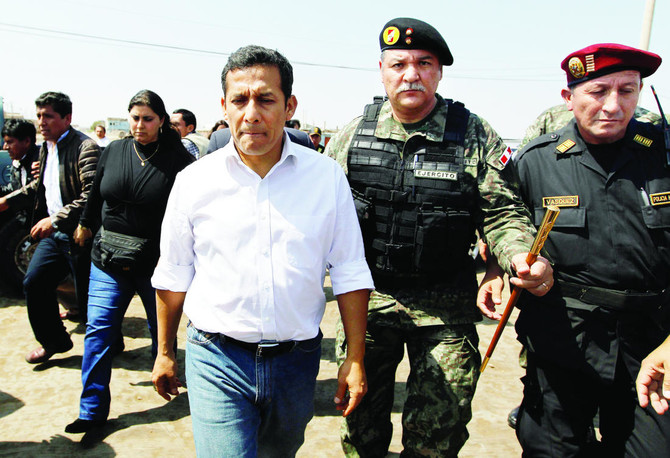LIMA: Peru’s national prosecutors office said it has opened an investigation into allegations of “crimes against humanity” related to the military’s fight against leftist guerrillas in the 1990s, in a case involving former President Ollanta Humala.
The investigation comes as testimony from two new witnesses suggests that soldiers under Humala’s command at the Madre Mia military base tortured and murdered civilians. Humala was an army officer during Peru’s bloody campaign against Maoist guerrilla group Shining Path during the 1980s and 1990s.
Humala has publicly denied the allegations.
Humala ran as a leftist but shifted to the right during his five-year term from 2011 through 2016, embracing free-market policies and backing a law that made it a criminal offense to deny the Shining Path’s role in a civil war that started in 1980 killed 69,000 people.
He was replaced last year by President Pedro Pablo Kuczynski, a former investment banker and free-markets proponent.
A previous probe into the alleged human rights violations was shelved in 2009 for lack of evidence. But leaked transcripts of recorded phone conversations published in local media in recent weeks appear to suggest Humala bribed torture victims to alter their testimony, which he has also denied.
Meanwhile, Peruvian miners have voted to approve a national strike in June to protest “anti-labor” government proposals, said Ricardo Juarez, secretary general of the National Federation of Miners, Metallurgists and Steelworkers.
Members of the federation, an umbrella group for hundreds of unions representing workers at some of the country’s largest mines, had met in the country’s capital, Lima, to vote on the measure. Peru is the world’s second-largest producer of copper, zinc and silver, and the sixth-largest producer of gold.
The strike is a protest “against the new labor rules that reduce workers’ rights that the government is trying to impose,” Juarez said.
The group — whose members work at mines owned by companies including Barrick Gold Corp, BHP Billiton PLC and Newmont Mining Corp. — will meet again in the first week of June to set a definitive date for the strike, Juarez said.
The national strike would be the first under President Kuczynski. Representatives of Peru’s Labor Ministry were not immediately available for comment.
A nationwide strike two years ago had little impact on production as companies had contingency plans in place.
Peru has boasted some of the highest growth rates in the region in recent years, but its economy remains dependent on mining, and conflicts between mining companies and organized labor, as well as indigenous communities, are common.
Zenon Mujica, secretary general of the union representing workers at Freeport-McMoRan Inc’s Cerro Verde copper mine — Peru’s largest — said members had decided to adhere to the planned strike.
Mujica had earlier said Cerro Verde workers were evaluating whether to strike after the union said the company had threatened punishment for a previous work stoppage. The workers’ three-week strike in March hit output at the mine.
Last week, workers at Southern Copper Corp’s Toquepala and Cuajone mines and the Ilo refinery returned to work after a two-week strike, which the company said reduced production by just 1,418 tons.
The two mines together produced 310,000 tons of copper last year, according to government data.
Peru prosecutors open probe in case linked to former president
Peru prosecutors open probe in case linked to former president











